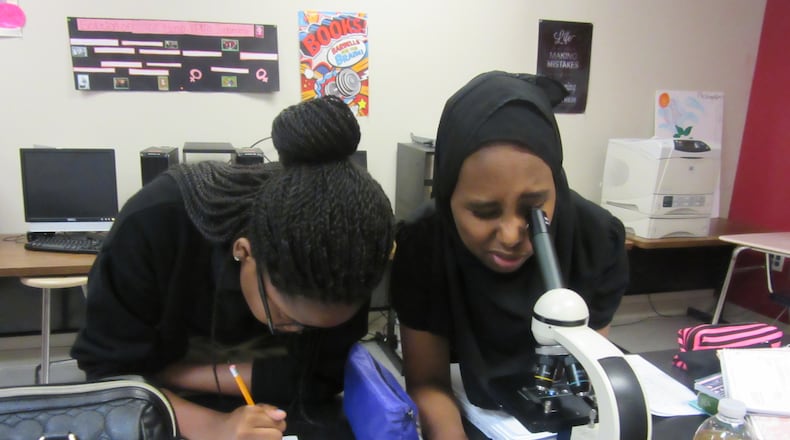Ten years ago, a grant from the Bill and Melinda Gates Foundation launched an innovative idea in DeKalb County: a public high school that compresses classes into two years so college-ready kids don’t have to wait a full four years before moving on. Since then, the concept of getting a jump on college has attracted some of the district’s brightest students to the DeKalb Early College Academy.
Today, DECA’s mission is still centered on the goal of helping kids get a head-start on higher education. The program, located in Stone Mountain, enrolls about 350 who win a spot in the academy after submitting a thorough application and undergoing rigorous rounds of interviews. In the last few years, more than 200 students have vied for a seat in a class size of about 110.
Once enrolled, students take a heavy load of college-prep courses designed to get them into free, dual-enrollment university programs by the time junior year rolls around.
“It’s all about getting college-ready in half the time,” said Edward Conner, DECA’s principal for the last three years. “The 11th and 12th graders can move on when ready to one of our partner schools, such as Georgia State’s Memorial Drive campus, where they earn college credits. That compresses the time and money spent on college.”
That compression means the workload for the first two years of high school can be intense, said history teacher Jason Butler who teaches 10th grade.
“This is the deep end of the pool, but these students are motivated, driven and willing to work,” he said. “At the same time, we’re addressing other skills and abilities they need to succeed in college. They can learn the material – and they do – but what separates our school from others is that we’re making sure students are prepared as self-sufficient learners. And we’ve had some remarkable successes –students who went on to law and medical schools.”
Sophomore Kanya Smith, 16, wasn’t put off by the idea of hard work. “I was interested in the challenge and the idea of being around people who are more mature at a young age,” said the 16-year-old. “I wanted to be in a more mature environment and start college early.”
Sophomore Anna Huff found DECA a welcome change from middle school, where she was bored. “Here, I like that I’m being challenged,” she said. “And I like that we are all focused; there’s no playing around. Everyone has a goal, and mine is to go to Emory.”
DECA’s graduation rate is consistently between 98 and 100 percent, and by the time graduation rolls around, most students have also earned an associate degree they can take with them to start college as a junior. Between 80 and 90 percent go on to a four-year institution. In addition, Conner estimates that about two-thirds of DECA’s students are the first in their families to attend college, and only about a third have a parent or a sibling who attended or graduated from a higher-learning institution.
Having a school with focused and dedicated students continually places DECA as one of the top three schools in the state, said Conner.
“Throw in two years of free college and a track record of high acceptance rate to stellar schools, and we have a lot to offer,” he said. “But we’re a tiny school, and even after 10 years, we sometimes still have to remind people we’re here.”
Information about the DeKalb Early College Academy is online at deca.dekalb.k12.ga.us.
About the Author
The Latest
Featured


